- Home
- Patricia MacLachlan
Arthur for the Very First Time
Arthur for the Very First Time Read online
Dedication
For all my family—
but especially for my mother, Madonna
Contents
Dedication
1 Moles
2 The Far Away End
3 The Mockingbird
4 Come All Ye Fair
5 Starlings
6 Mouse
7 Secrets
8 Meaningful Questions
9 Roses and Onions
10 Sounds
11 Five Dollars Even
12 The Casserole Threat
13 The Prism
14 Doing
15 Small Changes
About the Author
Back Ads
Other Books By Patricia MacLachlan
Credits
Copyright
About the Publisher
Moles
The summer that Arthur Rasby was ten years old was a problem summer. During the daytime his mother and father argued. At night they whispered loudly. Also, the downstairs toilet hummed and wouldn’t stop. The plumber, a woman in overalls the color of vanilla pudding, came to fix the hum. She banged, poked and stuck her head down the tank. The hum went on, though.
“Do you like your job?” asked Arthur politely. He perched on the edge of the bathtub taking notes in his journal.
“Until now,” said the plumber grumpily.
After the plumber left, Arthur kicked the toilet hard and the humming stopped.
Then moles came to visit the Rasby lawn. At least that’s what Arthur’s father said they were. He showed the crisscross of humped lines on the lawn to Arthur.
“What do moles look like?” asked Arthur.
“Ugly,” said his father.
Arthur wrote in his journal:
Moles: ugly
“And they always come no matter what I do!” said his father angrily.
Ugly, but loyal,
wrote Arthur. A nice quality, he thought.
When Arthur asked more questions, his father yelled and threw a shovel against the garage. It left a brown mark on the white paint, which made his father even angrier.
Arthur sat a long time beneath the honeysuckle bush waiting to see a mole. He wondered if moles had humming toilets and grumpy fathers too. Did they have small unseen creatures burrowing in their lawns? He put his ear close to the ground hoping to hear the sound of scrambling feet, or at least flushing, but all he saw was a black ant carrying a large white crumb. He smoothed a grass path for it so it wouldn’t stumble.
Arthur’s father came out of the house and put his hand on Arthur’s head. “Let’s fix ourselves something for dinner,” he said. “Mom’s not feeling well.”
Arthur knew that this was his father’s way of saying he was sorry for yelling about moles.
“What is there to eat?”
“Chipped beef,” said Arthur’s father, and they both laughed.
They went inside, holding hands.
“Are you lonely this summer?” asked Arthur’s father as they ate peanut-butter-and-lettuce sandwiches.
Arthur’s friends had all gone to camp or to visit their grandparents. But Arthur knew what his father really meant. He knew his mother was going to have a baby. He just didn’t want anybody to know that he knew. Nobody had told him. But he thought he knew the signs. His mother stopped to babble and ogle at babies—strange babies. It was embarrassing. She spent her mornings in the bathroom being sick, which, Arthur thought, was the trouble with the toilet. She got far-away looks on her face. “What?” she asked Arthur idly when he asked her a question. “What did you say?”
Arthur knew that his father would want him to like the idea of having a brother or sister. But Arthur didn’t. Babies were not human. They made monkey sounds. You couldn’t talk to them. They grabbed things and wet their pants and threw up all over everything. Arthur knew. He had made a study of babies. He had an entire narrow-lined notebook full of observations on babies. And he didn’t want one.
“No,” Arthur said to his father. “I’m not lonely. But I sure would like a pet rat. A white one with a long pink tail.”
“A white what?” asked Arthur’s mother, standing at the kitchen door.
“A white rat,” Arthur told her with some satisfaction. He knew how his mother felt about rats. He watched her bathrobe billow out behind her as she fled to the bathroom.
And so it was that Arthur came to stay with his Great-Aunt Elda and Great-Uncle Wrisby the summer of his tenth year.
“They’d like to have you,” said his mother.
“There’s lots to do there,” said his father.
And Arthur went to his aunt and uncle’s house while his parents went off to practice not yelling at each other.
On the way to his aunt and uncle’s, Arthur took out his journal to see what he had written about them. When he had been seven, he had written one entry under their name.
Their house is big like a manshun. It smells like banas.
He corrected the spelling to read “bananas” and stared a bit at “manshun.” Arthur had been almost a baby when he’d written that. The thought made him squirm. He wondered if he’d been a monkey-babbling, wet, grabbing baby.
“Here we are,” called his father. Arthur heard a strange note of excitement in his voice.
The house was immense. Arthur smiled. Some things didn’t change from when he was seven years old. Once he had revisited a mountain, only to find that when he was ten years old the mountain was only a small hill. The house reached back over the land like someone stretching, its wings on either side like arms thrown back. Arthur wondered if it would still smell like bananas. Arthur could see Uncle Wrisby’s famous garden in the side yard, planted in alternate rows of onions and roses. No one had ever known why he planted such a garden. Maybe no one had ever asked. Arthur made a note in his journal to find out why.
Uncle Wrisby loped out to the car, tilted slightly forward as if he had a wind at his back. He was uncommonly tall, with a small head much like a graying tennis ball. It perched on top of his body precariously, as delicate as the gold-rimmed glasses that rested on his nose.
He bent down to peer in the car windows. “Come in, come in,” he shouted. He was hard of hearing, so he yelled. Everyone who talked to him yelled, too, even though Uncle Wrisby read lips very well.
“Coming!” called Arthur’s father. “We’re coming!” Arthur’s mother put her hand to her head. Arthur made a note to research whether the yelling would reach the baby inside her.
They climbed out of the car as Aunt Elda came hurrying out from the left wing of the house. She was shaped like an uncertain circle, made up of large shifting spaces like an easy-to-color coloring book. Her yellow-white hair was coiled over her head in fat braids that fell as she ran. She stopped several times to pick up the combs that had fallen along with her braids. She was followed closely by a russet-colored chicken. Each time Aunt Elda stopped, the chicken stopped, pecking at the ground. When Aunt Elda ran again, the chicken ran, too.
“That’s Pauline,” said Arthur’s father with a mysterious smile.
“Pauline?” asked his mother.
Aunt Elda reached the car, her braids down her back and Pauline not far behind. “Arthur!” she said, holding his shoulders. “You’re not a baby anymore.” That, at least, was to her credit. Arthur liked her immediately.
Pauline pecked cruelly at his mother’s shoelaces, forcing her back into the car. “I don’t think we can stay,” she called from inside. She was afraid of Pauline.
Pauline, frustrated, went over to peck at Arthur’s father’s shoes. He bent down.
“Hello, Pauline. How are you—comment vas-tu?”
Pauline stopped suddenly and tilted her head to gaze up at him. She came over to peck about Arthur’s feet.
“Say something in French,” said his father softly.
“Bonjour, chicken,” he said. Pauline pondered Arthur, cocking her head to one side.
Arthur’s mother sighed from the car.
“I think we’ll go along,” said his father. “Arthur’s things are all here.”
Arthur went over to his mother’s side. “I’ll be here,” he said.
“I know,” she said, reaching out of the car and hugging him close. “I love you, too.”
“Au revoir,” he said to his father over his mother’s shoulder. His father looked very pleased as he drove off.
“Come, come,” yelled Uncle Wrisby. “We’ll have something to eat. Then we’ll talk about the world and its workings.” He took hold of Arthur’s hand. “What would you like to talk about?”
Arthur stared at Uncle Wrisby. Here was someone who wanted to talk about things! With him!
Arthur opened his journal. “Moles!” he cried happily. “Let’s talk about moles!”
His pencil poised, the summer began.
The Far Away End
The house was a book, and Uncle Wrisby and Aunt Elda the characters. From the moment that Arthur walked in the front door, he was a new character . . . a willing captive in the life story of his aunt and uncle. He noted, recorded and stored in his head the old colored-glass windows, the long hallways and the worn stairways with sunshine at the top.
Aunt Elda sat Arthur at a round oak table in her kitchen. Its legs were chicken feet that grasped round balls.
“Here’s your list, Arthur. Check off the food you don’t like, and we’ll see what we can do about it.”
“You mean I won’t have to eat what I don’t like?” Art
hur asked. He thought about tuna-noodle casserole and spinach that grew cold on his plate.
“I said we’ll see what we can do about it,” said Aunt Elda.
The list was in alphabetical order. Arthur had checked asparagus and cauliflower when Uncle Wrisby appeared from behind an old door next to Aunt Elda’s black iron stove.
“Explore, Arthur,” he shouted. “You can pick the bedroom you want.”
“I can?”
“Go on!”
Arthur checked off eggplant, green peppers, spinach, then quickly, zucchini, and went to explore. He passed from room to room, opening doors, finding new rooms beyond. The house seemed endless. And it was full of things to look at and go back to later: shelves of books, rock specimens, deep chairs warm as cocoons and pictures of laughing people whom Arthur had never seen before. He liked their faces. There were many staircases and small alcoves lined with windows of wavery glass turned lavender from years of sunlight. And on the very top floor, Arthur found his room. He knew it when he opened the door. The room was large, with a window seat and tall windows. At one end was a small brick fireplace. In it were brass andirons with tops cast as sailing ships. At the other end of the room was the high bed, with a small stool by one side. Arthur climbed up. A quilt made up of many-colored squares covered the bed. On each square was a sailing ship; some were single-masted sloops, some ketches, some schooners. From where he sat, Arthur could see out the windows. The branch of a large tree almost touched the windowpane, and through the leaves he saw a river as it snaked down from the hills through the valley. Far in the distance were meadows with cows and sheep feeding.
“So you found your room,” called Uncle Wrisby from the doorway. He walked to the closet door and opened it. There stood Arthur’s suitcase and knapsack.
“How did you know?” cried Arthur.
“I knew,” said Uncle Wrisby matter-of-factly.
Pauline walked around the door, then flew over to settle in a rocking chair.
Uncle Wrisby and Arthur laughed.
“Bonjour, Pauline. Tu es très intelligente. It looks like Pauline knew, too,” said Arthur’s uncle. He sat on the window seat and leaned toward the windows. He pointed a long finger at the nearest roof.
“That’s the Hotwater house,” he said. “And there’s the MacAvins’ and behind that is Reverend Railbaugh’s garden . . .”
Arthur ran to the closet to get his journal.
“What’s that you’re doing?” called Uncle Wrisby.
“My journal,” said Arthur.
“Journal?”
“Like a diary,” explained Arthur. “I write about people, things I see, everything I think about.”
“Everything?” Uncle Wrisby looked at the notebook suspiciously. “You got me in there?”
“Maybe,” said Arthur, smiling. “Didn’t you ever write in a journal, Uncle Wrisby?”
“Nope,” said Uncle Wrisby, shaking his head. “Never. Don’t believe anything written. Only what I see.” He sat for a moment looking out the window. Then, abruptly, he stood up and went to the closet.
Arthur studied the wallpaper. There were scenes of a sea village, with church spires and hills going down to the water.
“I’ve got these instead of a journal,” said Uncle Wrisby. He took a pair of binoculars out of a leather case. “I can see way down the valley road and know what’s going on. When people are up close enough, I can even tell what they’re saying sometimes.”
“You can?!” Arthur slid off the bed.
Uncle Wrisby opened the windows and leaned way out into the leaves of the tree. Arthur grabbed his uncle’s belt.
“There, there you can even see that scatty man, Yoyo Pratt,” yelled Uncle Wrisby.
Arthur tugged at Uncle Wrisby’s belt. “Who? Why is he scatty?”
Uncle Wrisby came back through the window. “Not your business.”
Not his business! No one had ever said that to Arthur before. Everything was his business. He knew all kinds of secrets. He knew about Piggy Rathbone’s father’s secret false teeth. He knew about his Uncle Charles pinching women. He knew about his mother having a baby.
Uncle Wrisby handed the binoculars to Arthur.
“Look in the little end if you want to see things close up,” he said. “The other end makes everything far away.”
“Far away? Why would you want to see things far away?” asked Arthur.
“Sometimes you see just as well,” said his uncle. He looked at Arthur thoughtfully. “Sometimes better.”
“Dinner!” called Aunt Elda from the bottom of the stairs.
“Come on, Arthur,” said Uncle Wrisby. “Let’s go eat Aunt Elda’s weed crisp.”
“I heard that,” said Aunt Elda from below. “Just because I put herbs in the pot.”
Arthur and his uncle went down the many stairs and through the hallways to the warm kitchen. The room smelled of applewood fire and rose geraniums. Pauline perched on a stool near Arthur and watched him eat, tilting her head in brisk movements. For dessert they ate dark-chocolate pudding with warm cream. And when he was full, Arthur laid his head on his arms and listened sleepily as Aunt Elda and Uncle Wrisby talked.
There was darkness at the windows when Arthur felt himself being carried up to the high bed. He felt Aunt Elda’s hair brush his cheek when she tucked him into bed, and he knew Pauline was walking on the bedspread.
“Pauline, viens,” whispered Aunt Elda. Arthur felt Pauline hop from the bed, and he heard the small scratching sound of her feet against the wood floor.
When it was quiet, Arthur made his eyes open. He saw the moon through the tree. Why would anyone want to look through the far away end? he asked himself. Then he slept, dreaming of brass sailing ships, ice-white waves topped with spindrift and green-wallpaper hills that sloped to the sea.
The Mockingbird
There was feathered warmth by Arthur’s head. He awoke to see Pauline sitting on his pillow. She pushed her long neck down and pulled at a tuft of his hair.
“Stop. Arrêtes, Pauline,” said Arthur, laughing. She settled down on the quilt, satisfied that he was awake. He put out a hand and stroked her smooth back. He was fascinated by the staccato movements of her head.
He reached for his journal.
Monday, June 7: Pauline—my friend. French—why? Uncle Wrisby says moles are not ugly. They are secretive.
He jumped from the bed and sat in the window seat, reaching for the binoculars. Pauline followed him, settling on the wide windowsill.
The gravel road that passed the house was bordered by low stone walls covered with wild honeysuckle. Arthur knew about honeysuckle. He knew that you could suck the sweet juice from inside when it was in bloom. His mother had taught him that. He put down the binoculars, frowning, thinking about his parents. And then, slowly, he turned the binoculars around to look through the far away end. He moved the glasses carefully, studying the distant pattern of meadow and woods, now so far away yet strangely clear. He saw a small pond off to one side of the river surrounded by brush, and he watched the movement of birds swooping out over the water, nervously, as if they knew they were being seen.
Suddenly, a dark movement in the tree outside interrupted his view. Arthur put down the binoculars. The movement was a bird with black at the eyes, like dark pencil marks.
Arthur heard a noise behind him, and turned to see Aunt Elda standing in the doorway.
“Aunt Elda.” He beckoned her. “What’s this bird?” He turned back quickly, and the sudden movement frightened the bird to a higher branch.
Aunt Elda sat by Arthur.
“There.” He pointed.
Aunt Elda smiled. “Oh, that’s my mockingbird. He sits high up at the very tallest part of the tree or on the chimney. He sings every other bird’s song and his own. He imitates.”
“He does?”
Aunt Elda nodded. “He goes on and on, especially at mating time. He lets all the other mockingbirds know that this is his territory.” Aunt Elda reached up to take the combs from her hair. “But the best thing of all is how he lures his mate to his nest. He places something in his nest that he thinks the female will like.”
“Like what?” asked Arthur. “How do you know?”
“We’re old friends,” said Aunt Elda. “I know what he wants.” She let her long hair down the length of her back, and from her pocket she took a small pair of scissors.

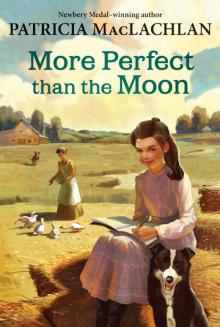 More Perfect Than the Moon
More Perfect Than the Moon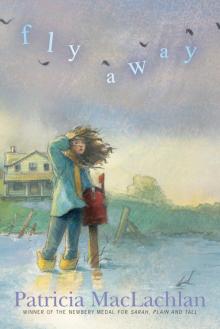 Fly Away
Fly Away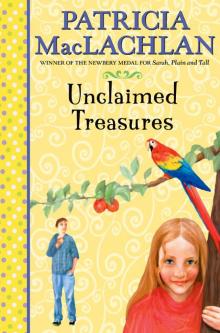 Unclaimed Treasures
Unclaimed Treasures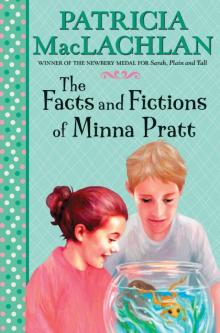 The Facts and Fictions of Minna Pratt
The Facts and Fictions of Minna Pratt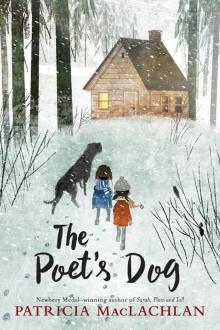 The Poet's Dog
The Poet's Dog Journey
Journey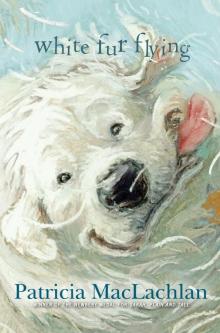 White Fur Flying
White Fur Flying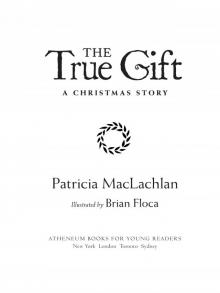 The True Gift: A Christmas Story
The True Gift: A Christmas Story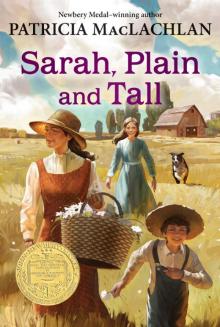 Sarah, Plain and Tall
Sarah, Plain and Tall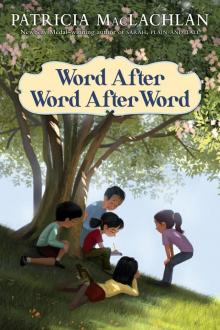 Word After Word After Word
Word After Word After Word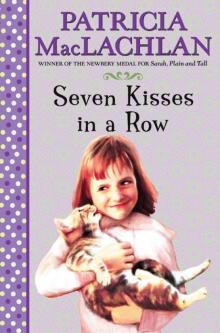 Seven Kisses in a Row
Seven Kisses in a Row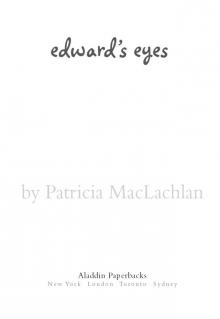 Edward's Eyes
Edward's Eyes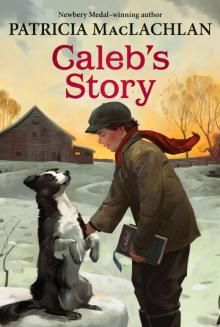 Caleb's Story
Caleb's Story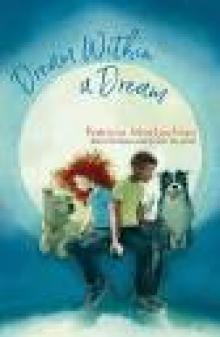 Dream Within a Dream
Dream Within a Dream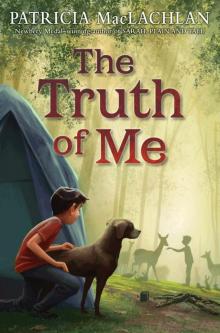 The Truth of Me
The Truth of Me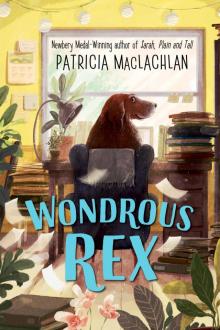 Wondrous Rex
Wondrous Rex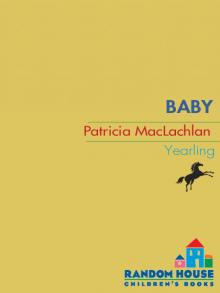 Baby
Baby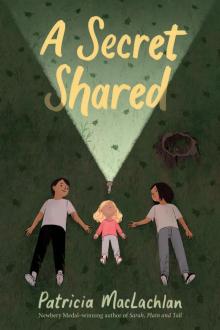 A Secret Shared
A Secret Shared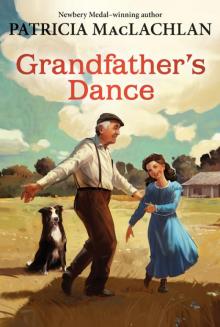 Grandfather's Dance
Grandfather's Dance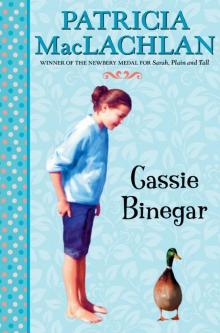 Cassie Binegar
Cassie Binegar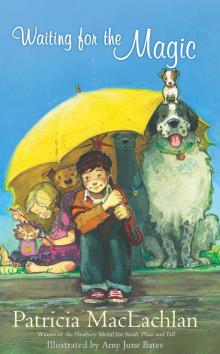 Waiting for the Magic
Waiting for the Magic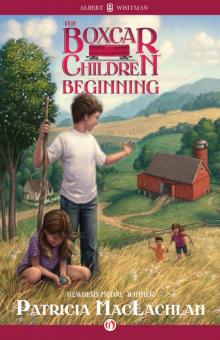 The Boxcar Children Beginning
The Boxcar Children Beginning My Father's Words
My Father's Words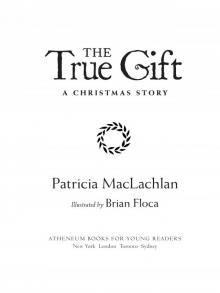 The True Gift
The True Gift